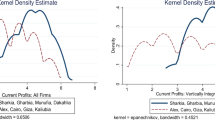Abstract
Free Trade or Protection? Belgian Textile and Clothing Firms' Trade Preferences. -This paper examines the positions of Belgian textile and clothing firms on trade policies. Observations on positions are generated by a survey. Along the lines of the political economy of protection and anti-protection we test whether firm-specific characteristics influence textile and clothing firms' trade policy preferences. The results show that international competition and having foreign establishments significantly determine firms' positions, but that product differentiation does not. A Chow test indicates no significant difference between firms' sensitivities in the textile and clothing industries. This suggests that the two professional organizations should co-operate on trade issues.
Zusammenfassung
Freihandel oder Protektion? Die Präferenzen der belgischen Textilwaren und Bekleidungsunternehmen. -Die Verfasser untersuchen, welche Faktoren am besten die Präferenzen der belgischen Textilwaren und Bekleidungsunternehmen in bezug auf die Außenhandelspolitik erklären. Informationen über die Präferenzen ergeben sich aus einer Umfrage. Nach der Theorie der politischen Ökonomie des Protektionismus müßten unternehmensspezifische Kennzeichen eine ausschlaggebende Rolle bei der Herausbildung der Präferenzen spielen. Die Untersuchung stützt die Hypothese, daß die Präferenzen signifikant korreliert sind mit internationaler Konkurrenz und mit dem Bestehen ausländischer Niederlassungen, aber nicht mit Produktdifferenzierung. Ein Chow-Test zeigt, daß die Unternehmen in der Textilwarenindustrie und in der Bekleidungsindustrie nicht in signifikanter Weise unterschiedlich reagieren. Daraus ergibt sich die Schlußfolgerung, daß die zwei Industrieorganisationen besser zusammenarbeiten sollten, wenn es um die Handelspolitik geht.
Similar content being viewed by others
References
Abreu, M. de P. (1995). Trade in Manufactures: The Outcome of the Uruguay Round and Developing Country Interests. In W. Martin and L. A. Winters (eds.), The Uruguay Round and the Developing Economies. World Bank Discussion Papers 307.
Amemiya, T. (1981). Qualitative Response Models: A Survey.Journal of Economic Literature 19(4): 1483–1536.
Blackhurst, R., A. Enders, and J. F. Francois (1995). The Uruguay Round and Market Access: Opportunities and Challenges for Developing Countries. In W. Martin and L. A. Winters (eds.), The Uruguay Round and the Developing Economies. World Bank Discussion Papers 307.
Buckley, P. J., and M. Casson (1976).The Future of the Multinational Enterprise. London: MacMillan.
Coppenholle, K., W. Devroe, and J. Wouters (1994). Het Europees Gemeenschapsrecht na het Verdrag van Maastricht.Rechtskundig Weekblad 24: 793–819 (12 February), 833–848 (19 February), and 865–878 (26 February).
Destler, I. M., and J. S. Odell (1987).Anti-Protection: Changing Forces in United States Trade Politics. Institute for International Economics, Washington, D.C.
Faini, R., J.de Melo, and W. Takacs (1995). A Primer on the MFA Maze.The World Economy 18(1): 113–135.
Finger, J. M. (1981). The Industry-Country Incidence of Less-than-Fair Value Cases in the US Import Trade.Quarterly Review of Economics and Business 21 (2): 260–279.
Francois, J. F., B. McDonald, and H. Nordström (1995). Assessing the Uruguay Round. In W. Martin and L. A. Winters (eds.), The Uruguay Round and the Developing Economies. World Bank Discussion Papers 307.
GATT(1994). Final Act Embodying the Results of the Uruguay Round of Multilateral Trade Negotiations. GATT Secretariat, Geneva.
Gujarati, D. (1992).Essentials of Econometrics. New York: McGraw Hill.
Helleiner, G. K. (1977). Transnational Enterprises and the New Political Economy of US Trade Policy.Oxford Economic Papers 29(1): 102–116.
Hertel, T., W. Martin, K. Yanagishima, and B. Dimaranan (1995). Liberalizing Manufactures Trade in a Changing World Economy. In W. Martin and L. A. Winters (eds.), The Uruguay Round and the Developing Economies. World Bank Discussion Papers 307.
Hillman, A. L. (1989).The Political Economy of Protection. Chur: Harwood Academic Publishers.
Judge, G. G., R. C. Hill, W. E. Griffiths, H. Lütkepohl, and T.-C. Lee (1988).Introduction to the Theory and Practice of Econometrics. New York: Wiley.
Kennedy, P. (1989).A Guide to Econometrics Cambridge, Mass.: MIT Press.
Koutsoyiannis, A. (1977).Theory of Econometrics. London: MacMillan.
Lanjouw, G. J., and M. M. Wielinga (1994). De Politieke Economie van Protectie en Anti-protectie.Maandschrift Economie 58(2): 113–128.
Lamfalussy, A. (1961).Investment and Growth: The Case of Belgium. London: MacMillan.
Maddala, G. S. (1983).Limited-dependent and Qualitative Variables in Econometrics. Cambridge: Cambridge University Press.
Magee, S. P., W. A. Brock, and L. Young (1989).Black Hole Tariffs and Endogenous Policy Theory: Political Economy in General Equilibrium. Cambridge: Cambridge University Press.
McAleese, D. (1994). EC External Trade Policy. In A. M. El-Agraa (ed.),The Economics of the European Community. New York: Harvester Wheatsheaf.
McKelvey, R. D., and W. Zavoina (1975). A Statistical Model for the Analysis of Ordinal Level Dependent Variables.Journal of Mathematical Sociology 4(2): 103–120.
Milner, H. V. (1988).Resisting Protectionism: Global Industries and the Politics of International Trade. Princeton: Princeton University Press.
Mommen, A. (1994).The Belgian Economy in the Twentieth Century. London: Routledge.
Nicolaides, P. (1993). Overview of EC Trade Policy II: Instruments, Commercial Relations. In P. Nicolaides (ed.),The Trade Policy of the European Community: Legal Basis, Instruments, Commercial Relations. Maastricht: European Institute of Public Administration.
Olson, M. (1965).The Logic of Collective Action: Public Goods and the Theory of Groups. Cambridge, Mass.: Harvard University Press.
Peckstadt, J.-P., S. Mazey, and J. Richardson (1993). Defending and Promoting a Sectoral Interest within the European Community: The Case of the Textile Polyolefins Industry. In: S. Mazey and J. Richardson (eds.),Lobbying in the European Community. New York: Oxford University Press.
Pugel, T., and I. Walter (1985). U. S. Corporate Interests and the Political Economy of Trade Policy.Review of Economics and Statistics 67 (3): 465–473.
Salorio, E. M. (1991). Trade Barriers and Corporate Strategies: Why Some Firms Oppose Import Protection For Their Own Industry. Doctoral disseration. Harvard University, Graduate School of Business Administration.
Scheerlinck, I., L. Hens, and R. S'Jegers (1996). Who's Afraid of International Deregulation? -Belgian Credit Institutions' Policy Preferences.Applied Financial Economics 6(4): 319–325.
Spinanger, D. (1995). Prosperity For All? Reflecting on the MFA Complex After Marrakesh.The World Economy 18(6): 665–680.
Tabachnick, B. G., and L. S. Fidell (1989).Using Multivariate Statistics. New York: HarperCollins.




